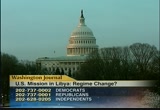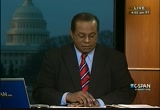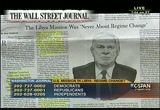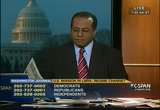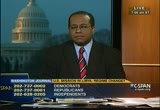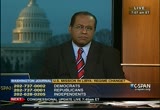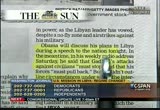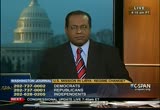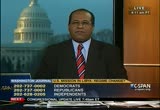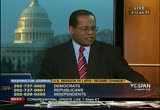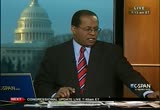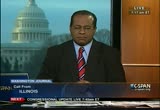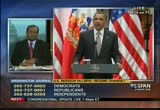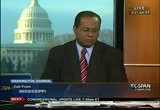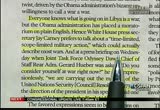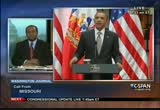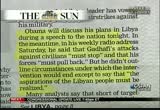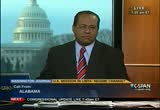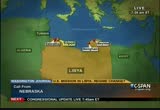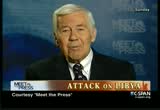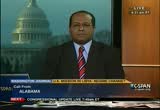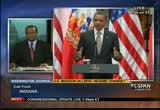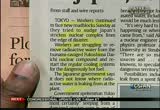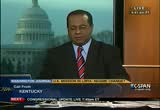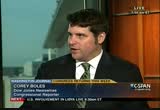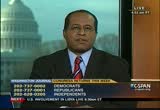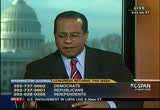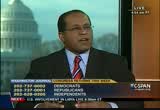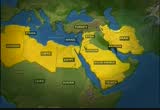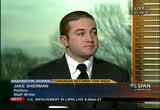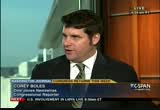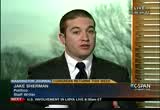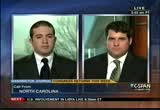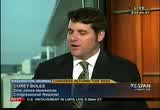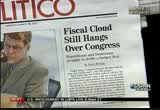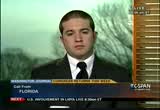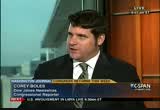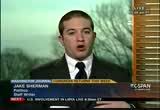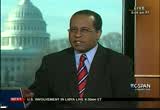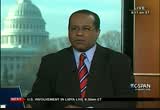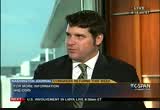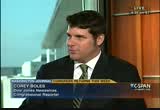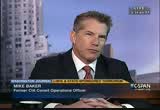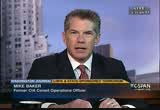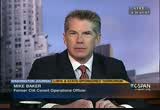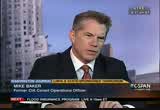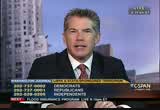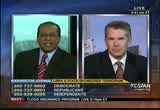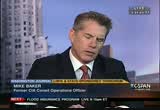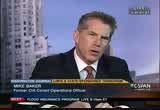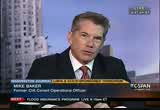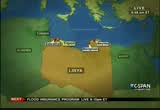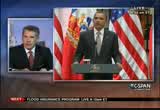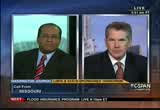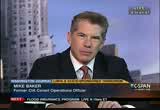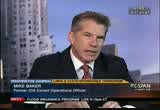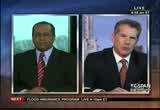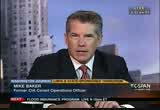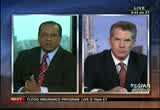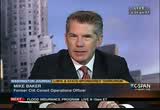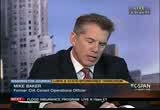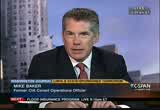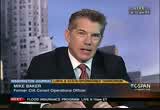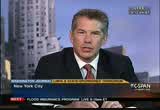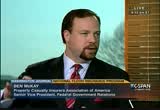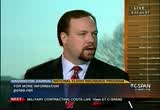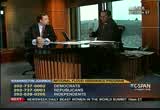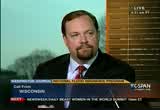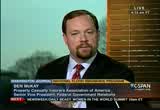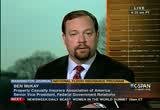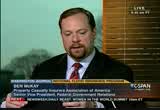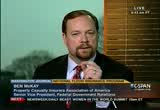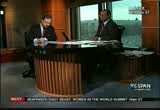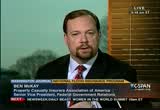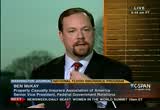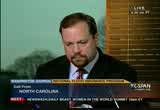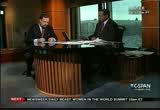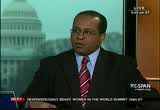tv Washington Journal CSPAN March 28, 2011 7:00am-10:00am EDT
7:00 am
cia covert operations officer and a look at congressional funding for the national flood insurance program. "washington journal"is next. ♪ ♪ host: a shot of the capitol as we begin another workweek in washington, d.c. welcome to "washington journal." in the headlines, more on the developing situation in libya and the u.s. involvement. one of the headlines in "the washington times" -- "the rebels move towards tripoli." the baltimore sun" with libya
7:01 am
facing questions. the public and congress question the u.s. involvement. in "the wall street journal" this morning "the u.s. will not back intervention." we continue our discussion with involving the u.s. and its involvement in the situation in libya, two words. coming up, "regime change." what should the u.s. mission be as the situation continues to develop in libya and whether or not regime change should be on that list. the numbers are -- host: if you have called in the last 30 days, send us a message electronically. the e-mail address is journal@c-
7:02 am
span.org. among the items in the paper talking about u.s. and its involvement in the libyan situation is this op-ed piece by fred stevens in "the wall street journal." "bolivia mission was never about regime change -- the libyan mission was never about regime change." in this, he quotes gates. "the mission was never about regime change." the article goes on to say "does this mean the mission accomplished"?
7:03 am
7:04 am
host: our discussion this morning for the next 45 minutes of the program has to do with the evolving u.s. mission in libya and whether or not it involves regime change. our first call comes from mississippi on the line for democrats. you are on the "washington journal." go ahead. caller: good morning. i agree with the way the president is handling libya. we cannot have war with any country we disagree with. host: atlantic city, new jersey. ray on the line for independents. you are on the "washington journal." caller: good morning. i love your show. i've been watching this intently. i told your producer, basically this is only my opinion. in the beginning of a few of
7:05 am
our upper echelon politicians sort of got tongue tied with the question of gaddafi. there may have been miscommunication. gaddafi have lost legitimacy of a long time ago. no one has done anything about it. one of the things that we have been engaged in -- our foreign policy for the last decade -- what has been known as a new look at foreign policy is what is called game theory. if i influence you this way, you will do that playing to my hand. in fact, people will generally do what is in their best interest. host: in those terms ray what do you think are the best interests of the united states as we move forward in this
7:06 am
situation? caller: i'm not the president of the united states and neither or you -- are you. do not get to hear those intricate things that nobody knows about. based on what i see on tv as an american, i would like to see this resolved with the least amount of bloodshed and have gaddafi gone. host: curtis in florida on the line for democrats. welcome to the program. caller: thank you. i just have a request. i wish your news guys would go a little more back-and-forth. lately it seems like you only want to do the republicans stuff. about to the situation, explain to me why the republicans are jumping all over obama when it looks like he has made a sincere effort to protect our boys and girls in the military. to my knowledge we have not had anyone murdered or killed. would they explain to me why he
7:07 am
has tried to do it right and bush and cheney go in there with false information and young boys and girls come home in body bags? jumping up and down about the debt -- that's 40% of our debt, these two wars. host: do you think the mission has been clearly defined? caller: when is the last time at any war -- during world war ii you have to do what you have to do at the moment. host: curtis in pensacola florida. in north carolina, we have stu -- i'm sorry. in albuquerque dave on our line for others. caller: we are paying for years
7:08 am
of wrong policy, anyway. we just keep doing the same stuff over and over again. i will take my answer off the air. thank you. host: in "the baltimore sun" this morning, their analysis. the president to speak tonight on u.s. aims. they write "barack obama entered the white house as a dovish warrior. what i am opposed to is a rash war, a war based not on reason, but on passion."
7:09 am
7:10 am
you are on the "washington journal." are you there? caller: i listen all the time, but i never called. i wanted to call this time because i want to address something. i'm pretty sure it is important to understand the whole thing. like what the guy from albuquerque said about us doing the same thing. the real reason why i think people are doing the same thing is because nobody is accounting for the mistakes we've already made. when i heard somebody say that we would do anything to help the rebel forces from losing, but we are not doing anything. that is the thing right there. also before i keep getting on with that, i want to talk about this.
7:11 am
all the different issues because of the tension those people feel towards different issues. the reason for all these things all these uprisings started because of the way people felt towards -- they felt like we were neglecting them. how can i say this? host: we will leave it there and move on to atlanta, georgia on the line for democrats. caller: good morning. my name is deta. this looks like more -- like war. a no-fly zone, the same people said it was an act of war. they have the united nation's rubber-stamp but they had to create all these contingencies in place to get the rubber-
7:12 am
stamp. it's very suspicious to me that people think no-fly zone -- it's a misnomer. it's a war. who financed the opposition? if people in this country raise up against this government, we would not tolerate it. this is confusing and we already have three wars going on. host: we will leave it there. we want to show you what some of the members of the administration are saying, both secretary gates and secretary of state clinton were making the rounds on the sunday shows yesterday. this is from "meet the press" and secretary clinton talks about u.s. progress in libya. >> it appears that his efforts have been stopped. i think if you were to look at where we were just a couple of weeks ago, he was clearly on his way to benghazi.
7:13 am
he was intending to show no mercy, to go house to house. i think we prevented a great humanitarian disaster. it's always hard to point to something that did not happen, but i believe we did. now we are beginning to see, because of the good work of the coalition, to see is troops begin to turn back toward the west and to see the opposition began to reclaim ground they have lost. host: we are talking about the u.s. involvement in libya and whether or not it should involve a regime change. our next call comes from james in kentucky on the line for democrats. good morning james. caller: yes. host: go ahead and turn down your television. caller: ok. i have it turned down. host: what do you think about the evolving mission of the u.s. in libya and whether or not it
7:14 am
should involve a regime change? caller: we were right to go into libya on account of the slaughter gaddafi would have done to his own people. it was a humanitarian thing to do. obama was right to do it. he could not get congress. congress has only been meeting three days per week and discussing things like npr and all this other stuff when they should have been helping obama discuss the war in libya. host: we will leave it there. the lead editorial in this morning's "financial times," "plotting the way forward in libya."
7:15 am
host: richmond, virginia on our line for others. david, you are on the "washington journal." caller: yes hello. host: go ahead. caller: we had normalized relationships with libya prior to this. tony blair went to libya in 2004 and announced that america had its new ally in the war against terror. condi rice went to libya also, to meet her new friend, muammar gaddafi in 2008. five weeks ago, libya was our ally. now there are many reports in the media about how many of the rebels are either al-qaeda or linked to al-qaeda.
7:16 am
what i do not understand is why this new clause i military alliance with al-qaeda has formed -- new quasi-military alliance with al-qaeda has formed. they describe how many of the rebels are al-qaeda or led by al-qaeda. you can go to a globalresearch.ca and there's a very good article on how many of the rebels are linked to al- qaeda. host: you think the mission of the u.s. should be altered because of the influence of al- qaeda in libya? caller: i think the mission itself is illegal because the un resolution itself violates the u.n. charter. the un charter says it can only be collective military action to restore international peace and order and not to intervene in
7:17 am
another country's civil affairs. host: richard, in chicago illinois. talk to us about your thoughts on the evolving u.s. mission in libya and whether or not it should involve regime change. caller: you get all these republicans and others that claim that obama did the right thing. first, he should have stepped in libya. the moment susan rice and hillary clinton urged obama to do the right thing, the republicans jump on it. there is nothing obama can do right for the republicans or the tea party people or what ever they call themselves. this man can do nothing right for the west is a crying shame they do not want to jump on board with this. they went into iraq with a false information. condoleezza rice was a bit
7:18 am
lighter -- a big liar and we are still there. host: glenn in paterson, new jersey on the line for republicans. our last caller talked about the fact that the republicans were not giving the president any credit. do you go along with that or not? caller: some credit. i'm a first-time caller, by the way. my main question is, what do we do after libya in the next uprising? if it were china or anywhere in the middle east, do we intervene to help the citizens of those countries? to me, it seems like a regime change as george bush started in 2001. the bottom question is, what are we going to do in the next uprising? thank you. host: before you go, do you think that regime change should
7:19 am
be an important part of the u.s. mission? caller: absolutely not. if we were a poor country ourselves, politically financially, we would probably ask the world to help us. we would may be turned to the un at some point but we would not want our leadership, especially in a democracy, changed by force. host: one of the op-eds in usa today this morning says all -- all"usa today" -- in "usa today" says "obama should channel reagan." our next call comes from mis souri.
7:20 am
julie, are you there? caller: yes i am. it's close to the big kill. host: what you think about the u.s. mission in libya and should it involve regime change? caller: well, i heard that muammar gaddafi -- i cannot say his name now. host: muammar gaddafi. muammar gaddafi. caller: yes. i heard he was going to go to every house. host: julie, you need to turn your television down and we will not get that feedback. ok? caller: ok. i will just turn it down. host: we are going to put her on hold and come back to her and move on to mississippi on the line for republicans. norman you are on the
7:21 am
"washington journal." caller: good morning. i have a relatively short comment. i believe that we should have not engaged in military action in libya in what was essentially an internal civil war. further, i do not think the president should have taken action without consultation with congress. i would also like to assert that have been a negative impact on our budget and that china and russia both with held a vote because they could take effect of economic action against the united states by simply stepping out of the way and let us do this, where we really have no strategic interest. host: your thought would be for the u.s. to get out completely. caller: my thought is that we should have never gotten involved. it's an internal civil war. host: now that we are involved, do you think the mission should involve regime change in any
7:22 am
7:23 am
again. what do you think about the u.s. involvement and should it involve regime change? caller: the united states has got controls to go by. host: what? caller: he has controls he should go by. however, because he's head of the u.s.a., and we don't have anybody to back us, i felt like -- i guess he felt like he needed to do that. i know muammar gaddafi was supposed to go from home to home. i'm glad he stopped that. host: we will leave it there. more from "the baltimore sun." "so far, it's much easier to explain why american joined the effort as an emergency effort to protect civilians then to envision how it will end
7:24 am
7:25 am
only way for oil to be transported was through the pipeline and that was trouble for europe and that is why the european allies -- they get most of their oil from libya. that is why they stated "gaddafi had to go." there's trouble in each country. even though libya had a civil war, they were willing to go in there and oust him. that's why they said he had to go. this is a civil war and they are trying to -- and going to go ahead and say -- tell him he has to go or he is going to die. host: omaha neb. on our line
7:26 am
for others. sean, you are on the "washington journal." caller: obama said he wanted to turn the operation over to nato. whether it is a un mission or a nato mission america is always at the front of the troops going into these countries. you have egypt next door that has an unstable country. a few weeks ago, they allowed iranian warships and now they're parked in the syrian port which you are not hearing about. with libya next to egypt and egypt with an unstable government, the suez canal will play a big part in this. they do not want a whole region now that is unstable. i keep hearing everybody say the word "war."
7:27 am
7:28 am
host: we are talking about the u.s. involvement in libya and whether or not that involves regime change. our next call comes from pam in new jersey on the line for republicans. good morning. caller: good morning. i just want to say that i do not know of anyone realized that when we invaded, the date we invaded libya is exactly eight years after bush's invasion in
7:29 am
2003 to iraq. doesn't that seem a little funny? host: why do you think that seems funny? caller: it seems likely keep going into all these same countries and we end up rebuilding everything. i think we jumped the gun on this one. i think he did it without congress even in session. they were not there. they're just coming back today. it seems like we did this so quick without any type of plant and everybody is trying to spin this that it was the right thing and we had to do this. i think we're just getting into another war. it's not going to be for a couple of months. it's going to be long. host: pam in middletown, new jersey. also on the sunday programs yesterday morning, senator
7:30 am
lugar from indiana was on fox news and he was talking about president obama and the fact that he had not explained why we are in libya. this is what he had to say. >> before our nation goes to war, there must be a plan. there must be objectives. and then the means as to how that is going to occur. that has not happened. the president has said we have had success because gaddafi would have murdered many people in benghazi. the fact is that there was fighting in been gauzy because the so-called rebels, the people who are not gaddafi's supporters started a civil war in libya following civil wars that commenced in egypt and libya. host: that was actually "meet the press" and not fox news. back to our discussion on the
7:31 am
u.s. involvement and should it involve regime change. birmingham alabama on our line for others. marlon, you are on the "washington journal." caller: good morning. i'm very disturbed by what i see the president doing. i've been a fanatical obama supporter. i've changed my party. i'm now in independent. when i look at what we did in libya, i wonder why we have not done it to the tyrannical governments of syria and saudi arabia, where you have the worst of oppression against women. i wonder if it has anything to do with the fact that gaddafi has one of the highest living standards in africa -- all over africa. most of the people are working.
7:32 am
america is number one in infant mortality and incarceration. libya is 69th in the world for incarceration. they have a high illiteracy rate. america has a high illiteracy rate. i wonder if there's any fact to some of the conspiratorial theories when they talk about zionists being in the government or the fact that gaddafi gave money for the self-help program in the black community. why would we attack a country with the highest living standards in africa and most of the people are working? i'm very confused. thank you. host: are you still with me? caller: yes. host: it's the u.s. actions in
7:33 am
libya lead to a regime change, will that lead to the way you support or do not support the president? caller: yes, it will. i know what happened in some parts of africa when president clinton came not to act. i look at a tyrannical governments in the parts of the middle east. they do not have the high living standard that libya has. host: we will leave it there. more stories from the papers this morning. some of them do not have to do with libya. in "the new york times" this morning, "supreme court to way sociology issue in wal-mart discrimination case."
7:34 am
7:35 am
they have never been to the war college and they do not know anything about military strategy. [inaudible] host: ben if our involvement does not involve regime change, where do think we should be going here? caller: if we would continue to do what the president has done, he will have backed gaddafi into his compound. the regime change will take care of itself. host: don on the line for republicans in indiana. you are on the "washington journal." caller: good morning. host: the new think regime change should be part of our
7:36 am
involvement? caller: yes i believe we have the responsibility and i believe president obama is doing the exactly right thing. is clinton-esqu. the institution of the no-fly zone, i think that was great. we cannot sit by as a nation and watch people be slaughtered. i think we should take this a bit further. i think we should support the rebels and give them advice. this should be the preferred method. somebody said one time -- everybody enjoys freedom. they enjoyed the meal, but they do not want to do the cooking. host: what if the u.s. is in a position to put troops on the ground? do you support that? caller: i do not think it is practical and i do not think we can afford it. i think the same result can be
7:37 am
realized with a strategy that is used now. host: also on the line for republicans out of columbus ohio hamdi. you are from libya. how long have you lived in the united states? caller: 31 years. host: from your perspective do you think the u.s. mission in libya should involve regime change? they are just following the un mandate -- caller: they are just following the un mandate. i was listening to some of your callers. a couple people thought we are in a war against libya just like iraq eight years ago. there's a big difference between libya and the rough -- and iraq.
7:38 am
the united states did not invade libya. there was a un resolution to save the libyan people from gaddafi. the libyan people have raised up against gaddafi, unlike in iraq. there is an ongoing massacre from gaddafi. there was not a massacre in iraq. host: how often do you stay in touch with friends and family that are still in libya? caller: not as much in the last week or so because all the lines have been cut off. we talked to people who have satellite phones because the libyan regime, gaddafi has control of all the phones. host: in talking with those friends and family, do they feel it is incumbent upon the libyan people themselves to move gaddafi out or are they looking for some sort of help from the
7:39 am
united states and the west? caller: the only thing the libyan people are asking for is the air protection. as you have seen in this revolution, there's no rebels in libya. there's no civil war in libya. those are ordinary people, housewives, husbands, a teenage kids college kids, business people. they're just fed up with gaddafi. gaddafi has been ruling for 25 years. finally, they say "enough is enough." they see what happened in tunisia and egypt. they say that enough is enough with gaddafi. god has lifted fear out of their hearts. everyone in the world. gaddafi has blood on his hands. he has american blood on his hands.
7:40 am
from the lockerbie bombing, he has blood on his hands. host: thank you. in "usa today" this morning "in japan, nuclear water source is far from clear." host: back to the phones. henderson, kentucky on the line for independents. robert, you are on the "washington journal." caller: good morning. blessed morning to all.
7:41 am
host: robert, turn down your television. that will help out a lot. caller: 1 second. i have it right here. host: what do you think about the u.s. involvement and should it involve regime change? caller: as a former moslem, i think it is absolutely disgraceful for the united states of america to be trying to change in regime they are not responsible for. you cannot go around trying to govern the world. the united states is not responsible for the libyan people. they have selected muammar gaddafi as their leader. america has a history of ignoring brutality tyrannical type of behavior around the world. however, when it seems to involve muslims or persons of color, america turns the other cheek. she loves the oil out of libya.
7:42 am
she loves to suck the oil out of nigeria. the berlin conference is a historical document that shows europe raping africa. as long as there's money to be made, america will find a way to deal. she wants to get rid of gaddafi because she wants the money from gaddafi. host: this op-ed in this morning's "financial times" talking about fed chairman ben bernanke. bernanke has started to do regularly scheduled news conferences. clive cook writes --
7:43 am
7:44 am
been over there. we have a lot of problems right here in america of. especially the unemployment rate in florida. the unemployment rate jumped 1% from 11% to 10%. we have thousands of people that are unemployed right in the state of florida. they have a new medical center opening up. what the government is doing for the local people -- we need help right here. all the money they're spending over there, we need right here. host: thank you very much for your call. in "the new york times" as well as other papers this morning, an obituary regarding geraldine ferraro.
7:45 am
she was quoted, "if we can do this we can do anything." "for a moment, anything seemed possible. a derailing of the juggernaut." you can read more about that in "the new york times" this morning. coming up in about 45 minutes a discussion with mike baker. he will be here to talk to us. coming up after this break, a discussion on congress coming back to work after one week in their district. we will be having a roundtable discussion with corey boles of the dow jones newspapers and jake sherman of politico.
7:46 am
7:47 am
during the program meet the students that create them. view the videos any time at studentcam.org. >> find the latest from the un security council administration officials, and reaction from world leaders on the c-span video library. watch what you won when you want. you are watching c-span bringing new politics and public affairs. every morning, it's "washington journal" about the news of the day, continue with elected officials, policy makers, and journalists. weekdays, live coverage of the u.s. house. also supreme court's oral arguments. on the weekends, our signature interview programs. you can also watch our
7:48 am
programming any time at c- span.org and it is all search able. c-span washington, your way. a public service created by america's cable companies. >> "washington journal" continues. host: congress returns this week from one week in their various districts. joining us to talk about that are corey boles of the dow jones newspapers and jake sherman of "politico." corey boles the president will address the nation tonight. what does congress want to hear from the president tonight? guest: congress, especially the republican side of the aisle was frustrated last week when this military action started and the president has not officially informed congress of the mandate and how long u.s. forces will be involved. the level of anger certainly
7:49 am
amongst republicans in the house, was real. they want to hear a time line and a course of action as to exactly why we're there and what we're hoping to achieve. host: your thoughts from what congress wants to hear -- jake sherman, your thoughts what the congress wants to hear? guest: politically, it gets somebody behind them. it gets money if that is ever needed. that's important for the president. host: we want to remind our viewers and listeners that the president will be speaking tonight on libya from the national defense university. that will be live on c-span at 7:30 p.m. eastern. if you want more details you can go to our web site, c- span.org. after the president talks and congress has a chance to listen, corey boles what is taught on
7:50 am
congress -- is top on congress' agenda? guest: i think you will hear a lot about libya but it will not take any action. the real issue this week and next week will be the budget. we face another looming deadline and the risk of a government shutdown. with lawmakers back in town this week that will be at the top of the list. host: jake sherman your thoughts beyond libya -- what is taught for congress' agenda? guest: whether boehner can sell some sort of deal. they have brought it up to 30 -- 260 from 30. that will be the key testament.
7:51 am
host: you bring up john boehner. there was an article in "the wall street journal" under the headline "boehner facing tea party pressure." is he getting support on trying to get the budget down and still work with other members of congress and the president? guest: in the capital he put up $30 billion in cuts and the tea party said it was not enough. they wanted $100 billion in cuts. they eventually got $60 billion. in ohio, he has pressure from local tea party leaders. he's getting pressure from all across the board. he is gambling and saying we are
7:52 am
cutting billions and billions of dollars. that has never been done before and that is important for him politically. host: we are taking a look at what congress will be working on this week. our guests are corey boles and jake sherman of "politico." if you want to get involved in the conversation, certainly do. you can also send us an e-mail or message on twitter. our first call comes from oklahoma city, oklahoma. christian on the line for democrats. go ahead. caller: first of all these republicans, this is hypocrisy at its worst. just like rush limbaugh says he cannot stand on homosexuals but
7:53 am
he becks elton john to come to his wedding. ronald reagan did the exact same thing. he bombed libya and he did not ask congress a thing. he did it under the war provisions act of 1973. i'm so tired of these republicans. check and come back and show that ronald reagan and nancy reagan believe in austerely the -- believes in astrology." host: the first part of his call, what president reagan did as compared to what president obama is doing. guest: that's a point been raised by republicans. reagan did this and there was not much criticism of the time. the democrats are very quiet now. they were very aggressive during the bush years about iraq and
7:54 am
about afghanistan in the letter years. to a certain extent, there is domestics playing now -- there is politics playing out domestically. both sides want to hear what the president is saying. host: its president probably since president ford and president reagan has had to deal with the situation in libya in some form or fashion. compared to us how those presidents did and how they work with congress in handling their particular libyan episode and what the president is doing. guest: [laughter] i have to note that i was not covering congress during the ford or during the reagan administrations. from the history books, during the reagan episode, it
7:55 am
was after the lockerbie bombing. because the president did not come to congress and ask permission, there was quite vast support behind him. here we have a situation where libya is the third if not the fourth in a series of countries going through this tumbled in the middle east and now we decide to go in the middle east. there are a lot of questions. what will obama do if these situations spread in yemen saudi arabia, and bahrain? host: seattle, washington. matthew on the line for independents. you are on the "washington journal." caller: what is our country coming to these days? being an independent -- i'm a union ironworker, ok. it's been the worst in the last few years than it has been in my
7:56 am
entire adult life. where we were in afghanistan, we were in iraq. we cannot really afford this stuff anymore. everybody wants to blame obama. even though i'm not necessarily a democrat -- we are going over into other people's countries and stuff. we should be worried about what's going on at home. do you know what i'm saying? you look at all these people who cannot keep their jobs. they work hard all their lives to have a home and they're losing them. host: jake sherman how much of a distraction for a lack of a better term is the situation in libya as far as congress is concerned and what they're trying to do in order to pass the budget and get some assistance out to people like matthew in seattle? guest: it certainly gives congress something else to talk about. it has been all about the budget all the time for the last several months and now there's
7:57 am
something to say. the president went into this country and he did not consult us. we're spending billions of dollars. it has also united the right and left. this does not fall neatly on partisan lines. people on the far left and the far right are talking about this. as congress starts to get its arms around this budget, which has not been close to easy, this will be on the mind of lawmakers and they will address it on the house floor. host: the headline in "roll call" this morning -- "both parties say the white house information on the crisis in libya arrives too late." pittsburgh pa., you are on the "washington journal." go ahead. caller: i'm watching. i am 74. i'm retired from the military.
7:58 am
i've been watching c-span for a long time. host:since obama has been president, everything is always about obama. if we did nothing and thousands of people got killed, what with this editorial say today? host: what do you think? caller: if we did nothing and thousands got killed, i really believe that the same people who are saying we should not be there would be saying we should have been there to save those people. that's my opinion. host: let's shift gears a little bit and talk about some of the other action that will be happening on capitol hill this week including a senate judiciary hearing on anti-muslim bigotry which is to be chaired by senator durbin. corey boles talk to us about
7:59 am
some of the other major hearings that are coming up in congress this week. guest: this hearing is very interesting. we had a similar one on the house side before the recess. democrats and perhaps the those who are sympathetic to democrats are trying to stir up anti- muslim feeling in the country. the other side says there's a legitimate debate that should occur as to what the appropriate dealing in terms of the minority population -- perhaps as sympathy for radical muslims. in terms of other hearings this week -- both sides especially in the house they are continuing to drive away on pulling together the fiscal 2012 issue. we spoke about the fy budget. they are now producing their
8:00 am
2012 budgets. there will be a lot of hearings and the various departments talking about that. host: jake sherman of "politico." guest: there are several hearings. the oversight committee is looking into a legend political meddling at the department of homeland security's office which will be a big hearing. there are several hearings in the ag committee on dodd frank which shows republicans will continue to chip away at democratic accomplishments over the last few years. those are the big ones. host: baltimore, maryland. caller: i love watching this show.
8:01 am
i have a comment about congress. were they adjourned? host: they were out in their districts. caller: [unintelligible] i cannot understand why they are not working for america. i understand they have to go to their districts. host: we will leave it there. they are spending more time in their districts and in washington d.c.? guest: they want to spend more time in their districts. many of these are brand new to politics. they spend time getting to know
8:02 am
their constituents and do fund raising. at a time when there are not a lot of laws being passed by congress, they can do more useful things in there to a strict and here in washington. host: democrats. caller: i was wondering. i hear a lot about our interests. no one is drawing a parallel between coasts of lowkosovo in the 1990's and what is happening now. every time they run into resistance, we knock them out.
8:03 am
8:04 am
corey boles tell us how much negotiation is done and how much is done by people we never recognized as we see them on the metro in washington, d.c. guest: much more the latter. the speaker and harry reid are speaking on the phone. i think the overall number and details of are done at the staff level. tuesday, there was a meeting that production anger because the sites could not agree on what piece of legislation to use as the pace of negotiation. -- base of negotiation.
8:05 am
i think they are a ways away from cutting a deal. a lot of work has to be done. host: the lead story in fiscal cloud hangs over republicans and democrats struggling to work out a budget deal. what is the make or break for each side in coming up with a budget deal? guest: republicans say there is no baseline for them to work with. democrats and the president had said that they do not want these legislative hang on such as abortion funding to a whole magnitude of issues. republicans say they wanted deep cuts and will not settle for anything less than $61 billion. we may see that number go down.
8:06 am
they are a long ways away from anything concrete at this point. host: florida you are on the line. caller: i have a question regarding libya. i want to know the doctrinal shift for the president to say when there is humanitarian suffering, let's go into a country. and we are taking a back stage roles in the operation. my other question is on the budget and if the $60 billion will lead to a reduction in the deficit. thanks. host: corey let's address the second part of it and how much it will reduce the deficit. guest: very little.
8:07 am
60 billion in cuts from the discretionary part of the budget, the annual amount that congress must approve grade each year to fund most government programs it is really a drop in the bucket. they really are not going to make much of an impact on the deficit. republicans had successfully changed the debate in washington away from how much should we spend to how much should we cut it has been significant. we have seen more cuts from discretionary spending and we have seen in a long time in a washington. host: back to the phones, texas. caller: thanks. it is amazing to me when john banoehner came into office,
8:08 am
he spoke about taking time off. why don't you guys stay in there and get the job done. it is amazing why we just sawcannot seem to do that. guest: there is always anger at how lawmakers work. they are in their districts more often to interact with constituents. many say it is not time off but time working. many are outraged held little congress seems to be working. there are negotiations going on behind the scenes at all times. lawyers, chiefs of staff, they are working full time, and they are not making over $100,000 a
8:09 am
year. less than two-thirds -- they are off in august and had some extended time off. they want people to be back in the district interacting with the situation. it will be tough when legislation comes up. a double edged sword for shore. host: more going on when the boss is back in the district? guest: they are in these rooms trying to hash out a deal. these are top aides in the leadership team. they are working hard. host: maryland, independent line. caller: thanks for your many contributions you have made thus far.
8:10 am
i am from west africa. i did it traveled to tripoli to observe a jamboree, 30 years after the presidency of an gaddafi. instead of looking at the american involvement in this process from a democratic or republican basis look at it in a way of enlightenment for the entire region. [unintelligible] host: another call from buffalo n.y., a democratic line. caller: i have a question for the two gentleman relating to the time that people spend in
8:11 am
congress dialing for dollars and getting out of their backing for political money. emplaning about the time they have to do to do that. i think studies have warned us that about 50% of the money that congress people raise the go to buying radio and tv time and a few newspaper advertisements. if they have to spend that much time and half of it goes for radio and tv spots why don't we have a bipartisan piece of legislation that says to the american media, you will provide, free of charge, a certain amount of time in every election. that would cut 50% of their efforts raising money. why don't we have this
8:12 am
bipartisan effort? guest: most media companies are not flush with cash these days. it is an interesting point. the money aspect of politics is that -- the average freshman house member has to raise $25,000 a week from the moment they arrive in washington on a chance of reelection in two years time. far from me to suggest a fix for this problem. host: republican line, springfield, ohio. caller: my question is in the direction of how much should we as a nation, be supporting
8:13 am
things like this and be directly involved and do things like we are doing in libya. i am a marine. i served my time. i think a lot of what we did was an absolute waste. what should congress do to try to remedy these problems and the activity? guest: care is whether we should be going to a country for a humanitarian purpose? if a country poses immediate danger to the united states -- secretary gates is not sure if there is an immediate danger, which makes it hard for the president to sell this. but we will discuss tonight what we should do in a conflict like this. as a previous caller stated,
8:14 am
there are many humanitarian crises across the globe, and we are not going into every one of them. it is an interesting question. what is the threshold for going to a country with a humanitarian crisis and should we be doing it at all? the president will lay out some sort of an answer to that later tonight. host: we have about another 50 minutes with these guests. texas, for democrats. go ahead. caller: i wanted to know have either of the gentleman talked with the republican party. how much do the republicans and the t backers want cut for the american people? we are sitting out here and are
8:15 am
in bad shape. their philosophy is that everybody is on your own. the wealthy are in good shape. the poor are not. i can understand this from their philosophy that they believe you either sink or drown. have either of you spoken with the republican party and the trs ea baggers and how much of a cut do they want from the american people? guest: republicans are in power in the house. many of those members were back in the primaries by tea party organizations. there are any number of organizations within the district. when the speaker proposed 30
8:16 am
billion in cuts, the tea party said it is not enough. they got more. now we are talking a debate up to 60 billion. once this dispute is over, we move over to the debt and deficit issue. conservatives will exert a considerable amount of influence i think. guest: i think john boehner would strike a deal. it is important to keep in mind. we are keeping the government open on two week cycles as this drags on. the republican leadership early on tries to say right after the election but they are on the
8:17 am
same page as the tea party and they are one entity. there is notified. i think it is becoming less and less true. the tea party in virginia says that these guys are not holding up to what they said they would do. they drive the ship in a really big way. host: providence, rhode island line for independents. host:gueshostcaller: i get sick and tired of everyone talking about social security. and money goes into a slot pot
8:18 am
-- they should be able to take care of roads and bridges if the government did better on their own. guest: so security is an interesting one. there is a large debate regarding medicare, medicaid, and a social security. democrats say there is no problem with some security. for now, it is not running a deficit, which is true. it is not contributing to a national deficit, which is arguable. it seems that if there is a grand bargain to be reached this year it probably will not touch so security. there may be amenable to changes later down the road. democrats do not want to be
8:19 am
seen -- do not want to seem to be messing with this program. it may be a lot of talk, but i do not think so security will get touched for the next couple of years. host: any major appropriations to deal with some of the infrastructure problems? guest: the kept funding levels the same bible leave for the highway bill. a more permanent bill will cost more money. there is no willingness to spend more money. they want to cut billions of dollars. to do a grand program to fix roads into bridges which everyone thinks is a problem, it is just unlikely. i cannot see it happening at
8:20 am
this point. host: air travel on the radar of congress. they want to work to bridge differences on different fronts. take any one of the three. tell us what is happening in congress. guest: the aviation bill is like the highway bill, a perennial issue in congress. there are different versions in the house and senate recording whether or not fedex should unionize. there is talk about a travelers bill of rights be.
8:21 am
it is a complex bill address in all aspects of the aviation industry. the gridlock we are facing is kidding a budget done. host: martin, mich., a democrat. caller: thanks for taking my call. right now the paper has come out that we have 1.4 million people in this country as of october 2010 out of unemployment. as of right now with my calculations seeing the job market pick up as of 2009, 650,000 people laid off. they have made no jobs. they have passed no bills on in
8:22 am
a jobs. the president is having a good life with no bills signed. what are we going to do with almost 2 million people without unemployment right now that do you realize what is going to have been at wall street when all of this hits? guest: i think the public lands would contend that cutting spending will create jobs. companies can spend money if they know where the government is the one with their finances. slashing spending and school spending social programs, is going to create jobs across the country. that will be a problem for republicans. if they see congress wants to cut spending, a light kit in theory but how does it get
8:23 am
people off of the an inch -- they like it in theory, but how does it get people off of the unemployment woes. it will be interesting to see how they can solve this. host: athens michigan. caller: the congressman want to talk and argue. they want to cut all of us to nothing. athens is a very small town. we are a form country. we cannot afford to keep being cut, cut, cut.
8:24 am
why is it that each party can get all of this money up for their party to be elected and not be taxed but you want to tax everything we have. you want to steal from social security, so that we are now short. that occurred during vietnam. host: is there one issue on which everybody agrees in this particular congress, or is everything divided among political groups, regional groups, various aspects within the parties themselves? guest: know. -- no. republicans have switched the debate from where do we spend
8:25 am
too where do we cut. i think that will be a constant theme over the next year's s to what extent we should pare back. democrats will continue to defend what they see as federal programs. republicans will say there is too much waste and fat in the budget. it will stay that way until we get to the next presidential election. caller: i take care of two elderly parents who live in the district. write it down the street from my parents' home is a plant that went under, a component of the general motors plant. thousands of jobs are gone. they tore down the building. i spent several days at the b a
8:26 am
in ohio. you would think both sides reachedva in ohio. you would think both sides would agree on this. when i went out there and spent hours talking to different hands of offices, they really pushed our second world war veterans aside. they are understaffed, overworked. i hope c-span does a serious show on to the situation that our veterans are finding themselves in. you would think they would agree to funding the veteran affairs to make sure they are getting everything they need. host: we will leave it there.
8:27 am
anything coming up regarding veterans' benefits? guest: it is a complex congress. this is an interesting situation for the speaker. he has to make these grand decisions. this is a much more difficult and a polarized congress. he has to deal with these issues. people have to deal with these constituents that are angry. host: illinois, independent line. caller: thanks for c-span. why are we not going in on those poor people that were killed on their yachts? if we are going to attack somebody that is somebody we
8:28 am
should attack. why don't we go into somalia? why are we bringing home these boys with no arms and legs? it is insane. why don't we protect americans that were attacked on the open seas? host: how much real influence and participation does congress have in areas of foreign policy and defense? guest: take control the purse strings. that is their way of agreeing or disagreeing with the foreign policy of the administration. house republicans made it very clear that the dispute should stop the nation's borders and be silent in terms of the president's foreign policy. libya could be a turning point. the president almost call --
8:29 am
called congress with an afterthought telling them what was about to happen. republicans in the house may not sit quietly about what he is going to do. i do not know if there will be a general effort to reduce funding for the pentagon. congress can jump up and down and make a lot of noise. if it wants to stop the president from doing something they will not fund it. we have not seen that since vietnam. host: the first female on the main campaign ticket for the white house passed away over the weekend. does her influence -- is it
8:30 am
still being felt on capitol hill especially among the women represented in congress? guest: she was pretty accurate in policies even in the last decade. sarah palin and others sent out a message. i think you are seeing across the board -- many women in congress shattered the glass ceiling on the way up. host: thanks gentlemen for being on the program. in just a few minutes after this break, we will talk about state sponsored terrorism and libya. first we want to get an update on c-span radio. you are watching "washington
8:31 am
journal." . >> presidential politics is moving ahead towards the 2012 election. the president held his to does late election night victory rally was held at a skyscraper. and another address will be there. a former minnesota gov. has readied a national team of fund- raising consultants for his run in 2012 that includes some former and john mccain in may from a campaigners. those are some of the latest headlines on c-span radio.
8:32 am
>> house and senate members have been spending a working week in their home districts. an attempted repeal of healthcare, f a a reauthorization, paton reform -- all of these are on the line. you can search by topic, bill number, or members at c-span.org slash congress. our c-span library is available to you on television, radio on line and social networking media sites. you can also check our video library. we take a c-span on the road bringing our resources to your community. washington your way the c-span network. now available in more than 1 million homes.
8:33 am
created by cable companies provided as a public service. "washington journal" continues. host: mike baker joins us to talk about libya and state sponsored terrorism. welcome to the program. guest: thanks very much. host: in light of the no-fly zone in libya how much concern that gaddafi may try to exact some sort of revenge especially on the u.s.? guest: given his history and his past involvement in terrorism such as the lockerbie bombing it is a scenario that you have to be made aware of. it is of concern particularly to the intel community in terms
8:34 am
of monitoring what his services may be doing. there is probably a calculus going on with gaddafi. he is a very calculating survivor. he has been in place for some 42 years. you have to look at this and say, he is making the analysis that if he were to engage in some terrorist act as a result of what is happening now it would pretty much spell the end for him. i think he is looking at the likelihood of still being in power with control over the western side of the country. it is a scenario that you have to be concerned about. host: how much do know about
8:35 am
what he is thinking about what is happening in his country right now and who is advising him on what his next move should be? guest: he has in part survived over the years by purging those who moved up through the military ranks and within his government, once they appear to be kidding too much of a profile or their own following. at the end of the day, it is not unlike a lot of other dictators. he relies on a very small circle, which is often his immediate family. the potential of what that means, whether we are talking about gaddafi or any other dictator is, a decreasing ability to obtain human sources that can provide insight into
8:36 am
the plans of someone like gaddafi -- his plans motivations, what he is actually thinking. intelligence operations want to know that about him. you have to look at the variable potential targets and people who may have information. profiled the individuals into determine who is a likely target. we have had a hard time developing quality sources in libya for a long time. it plays out to some this -- degree to understand where this may be going on the ground. we know where it is going in the air. the air attack allows for the rebel advances. in terms of what is going on in his compound and what people are thinking?
8:37 am
very limited. host: why is it difficult to develop this intelligence on the ground in libya and in certain places of the middle east? guest: we do not blend. in order to develop quality sources, you would like to think you have that one-on-one contact, an initial development rather than working through access to someone that has access to them. getting that person can be limited in a place like libya. you can argue throughout other parts of the middle east. we have traditionally relied
8:38 am
heavily on our foreign partners in that part of the world to provide us with additional insight to what is going on in the inner circles. without going too far into sources and methods and other sensitive issues, that is a look at the problem. host: we are speaking with a former cia officer. our discussion for about the next 40 minutes will center around the be and state sponsored terrorism. if you want to get involved, the numbers are on the screen. you can also send us messages via e-mail can't twitter. -- and twitter.
8:39 am
tell us more about diligence llc is?. guest: it is an intelligence firm. when you have my type of background, you wonder what he will do in the public sector. we provide support to multinational financial institutions law firms, whoever may need it. it is something to do due diligence on individual companies that another firm may be considering doing business with. a u.s. company could be worried about what their foreign competitors are doing overseas. -- they can create an unlevel playing field. it all falls into the same pocket of information that will
8:40 am
make business dealings more transparent and more profitable and minimize the risk. host: our first call comes from louisiana on average democrat line. -- on our democratic line. caller: i am concerned with the visit of republicans meddling with a price of survival. it is written indelibly on stone that we have had a price of survival. and we have had a government support us. we know who the big threat was with a cold war and what not.
8:41 am
we have to have friends of our enemies and enemies of our enemies. when we cannot exist, we would not remain. we need oil and trade and we have to sell and buy stuff. host: he made an interesting mark -- a remark. one day the friend of your friend is your friend, and then they are your enemy. tell us how intelligence gathering survives in a world like that where the line keeps shifting back and forth. guest: a terrific point. at the end of the day, nothing is black and white. you learn that very quickly in
8:42 am
the intelligence world where oftentimes your choices and who you deal with overseas is not between good and evil. it often times is between that and a less bad. egypt is a good example. b -- ad and less bad. -- bad abdnd less bad. egypt is a good example. how could a m supportubthey support mubarak all this time? it is not that simple. you have to make concessions. every country acts in their own interests. sometimes we end up apologizing for that to win overseas, the
8:43 am
other countries are much more adept at it and less apologetic for doing it. gaddafi in libya is another good example. our friends and enemies and the shifting in the nature of that relationship. for years, gaddafi was on our enemies list. suddenly in 2004, by some calculations, he became our allies. -- ally. now he is on our bad guy list. it is difficult and people are trying to process what is happening in libya right now and acetylene here justification's for what we are doing -- and suddenly here justification's for what we are doing such as he is a terrorist. at the end of the day you make a decision based on national
8:44 am
best interest. oftentimes, it is not ideal but it is the real woundrld. host: we have a twitter message. your thoughts? guest: an interesting message. a great deal of war is based on terror. you are trying to control a population. you are trying to control your leverage on the opposition. it is an unfortunate aspect of it. you argue about what is going on in places like libya right now or in the country run by a dictator or strong man.
8:45 am
there is always an element of terror there. whether it is imposed on people by psychological means for the police or whomever, under the control of the strong arm -- terror is a component of any war. that is a given perhaps. host: albert guess is now president of diligence llc. annapolis, md., independent line. -- our guest is now president of diligence llc. annapolis, md., independent line. caller: we have limited strike
8:46 am
with coalition forces in the u.n. in iraq, we have been there 10 years with an effort against someone who did not have weapons of mass destruction that we claimed. it is interesting political response to a democratic versus a republican president. guest: that is a very valid point. there is a problem with how this developed and how it was explained. i look at what is going on in libya right now, and i think it was ill-conceived and improperly managed and poorly explained. we are going in now because of the terrorists. the idea is that we wanted to prevent a humanitarian crisis
8:47 am
and protect the citizens. that is used as the basis for this military action. the arab league calling for a no-fly zone was the tipping point for the current administration to say, that is what we need to move forward. i would argue that it could act in its own best self interest, to get rid of somebody they cannot stand. part of the political response may be confusion over where we stand. are we making the mental leap from saying that we are protecting citizens to now we are advancing with the rebels as they push past where they were when we stepped in? that is an entirely different issue. perhaps the president will address that this evening. then there is concern over this
8:48 am
limited approach. at the end of the day, it is relatively ineffective. i think we will see it. now that the fight may go to the urban centers air power is relatively useless. we are working our way towards a stalemate if we are not putting people on the ground. there is a lot of criticism coming from the democrats as well as the republicans. i think it is more of a failure to understand what it is we are doing in how we tend to accomplish it. if we finish this as a stalemate in gaddafi is still in charge albeit with a theory ltd. reached in the eastern part i do not see how anybody describes this in the result as a success. host: you have no idea what is in the speech of the president for whom he has been talking to
8:49 am
in putting this together. how much consultation should the president have with intelligent sources about how much he can say and what he should say is in the speech? guest: a great deal of context. they have a real seat at the table, with anything like this. they have to see where we are at this point. the problem is, the real world is never get to the point where you develop and operation and pulled the trigger with a lack of information. you never have all of the information you want. if you wait, things will go further south or things will pass you by. the president will be given all best intelligence available. that will be explained in
8:50 am
context. this is what we have, do not have, are unsure of. in any situation like this, the intel community has a major role to play. the president makes the call. where do we go with this and how do i put this into my strategy, my policy? i would argue that information is provided as best we have in terms of who the opposition is. who are these rebels that we should go in and support? that calculation was that we may not know that much about them. there are elements within the opposition that are not available to us. the decision was made that anything is better than gaddafi.
8:51 am
host: we will have coverage of the president's speech to the nation of the u.s. involvement in libya coming from the national defense university. live coverage at 7:30 p.m. eastern time, 4:30 p.m. on the west coast. for more details, go to our web site at guestc-span.org. next caller. caller: mike x brother in law as a retired navy cmdr. winners in this latest war is a military industrial complex. mike, you are a good spokesperson for the work complex.
8:52 am
is there ever a program of conflict resolution? what if all of the people working for him on conflict resolution -- we have all of these people and putting troops on the ground. where is conflict resolution in this scenario? guest: i would argue that there has been a concerted effort to avoid escalating this problem in libya. we saw that early on when there was a great deal of complaining about the fact that we were not getting involved sooner. during the course of that, there was this conflict resolution effort. the problem is there was a drum
8:53 am
beat from both extremes sides. there was a call for a no-fly zone. some wanted to go out there immediately. the arab league started calling for a no-fly zone. once that happened, i think it became very difficult to say we will not take action. the security council called a no-fly zone, and off you go to the races. i think there is an understanding, when you see it in the efforts of the administration to handle this tornado. we do not want this thing to move forward. the resolution does not allow for troops on the ground. the intentions are could. there is a problem with it being
8:54 am
a bit of a mottled mess and wear it is going. ultimately the -- muddled mess and where it is going. we had a 12-year no-fly zone in iraq. many may argue that we accomplished little. i think there has been an effort of conflict resolution and an effort to try to resolve this. put pressure for gaddafi to leave or back down. when that did not happen, the drum beat for the no-fly zone became unavoidable. off you go. host: ohio, go ahead. caller: it is my impression over many years that the united states intelligence agencies have been very in effect in
8:55 am
finding spies within their agencies -- inept in finding spies within their agencies. do you agree with that? what have they done to prevent these people from b train us? guest: a terrific question. we could spend all day on that particular topic. i would argue that -- it is not like the thriller books or feature films. any time a spy is found within your ranks speaking for the cia, the tendency is to say, how could this happen? the reality is that it is an extremely difficult process.
8:56 am
counter intelligence, finding somebody within the ranks of your own service is a very difficult thing to do. then you have to develop it to where you have all of the evidence you need to ensure that you can prosecute successfully. we have had problems. no doubt about that. a free service has had problems. that is the nature of the game. -- every service has had problems. that is the nature of the game. it could be as simple as an emotional issue at home or a financial issue. something tips in that person's life and causes them to betray their agency, their family, their country.
8:57 am
it is a phenomenal issue when you think about the depth of the trail. it is the reality -- death of betrayal. it is the reality of the world. some people are looking for these opportunities. everytime we have had an incident whoever it may be, we take it and learn better how to understand the psychology of the traderitor. you learn how to monitor better within your own rank and file. it is a human business. it is like preventing terrorism. this will never be a zero risk gain a. -- game.
8:58 am
host: let's move on to this e- mail that we got from new jersey. she wants to know if the libyan leader has to relinquish power what would happen next. guest: it is difficult enough to keep tabs on him while he is running the country. if he is not running it, how do we keep tabs on it? it would depend on the terms of his departure and if he would have a safe haven. it is unlikely that it would be a peaceful ending in a resolution. who would offer him an opportunity to live out the rest of his bizarre years? the bigger question above that is -- understand where the
8:59 am
viewer is coming from. does he pose a threat once he is out of power? he has tremendous personal finances and resources and a network. once he is out of power the answer is he would work with the host country. whoever agrees to give him a safe haven, he would work with them. it would be an international effort to create the opportunity to get him out and have a peaceful transition. what does the government look like in libya? what does it do to hour sphere of influence in reasonable stability and issues related to it? look at what is happening in other areas. a remarkable piece of history in the middle east right now.
9:00 am
host: we are speaking with mike baker, a former cia operative. thank you to al jazeera for helping us out with some of that video. caller: mike, i have always been fascinated by the cia. earlier, you said that sometimes you have to deal with terrorists like gaddafi which the bush administration did in 2004. the only reason bush focused on removing wmd's from libya with gaddafi's approval was to distract us from the absence of wmd's in iraq. gaddafi held all the cards because he knew the bush administration was using him to pacify the americans who were very angry about laws regarding wmd's in iraq.
9:01 am
host: mike baker, your thoughts? guest: again -- that's not any motive - an emotive subject, is it? if we look at gaddafi and how that played out, i think we had to take up that opportunity. hille still holds a store of weaponry. there are several tons of mustard gas that need to be declared -- need to be destroyed. they destroyed several tons of it in concert with the un in 2004. you have to work with gaddafi. does it smell? yes. but it's better than the alternative. when an opportunity comes up to say, let's work with him, he is renouncing weapons of mass destruction, we will get in there and work with the un to
9:02 am
start registering the stores of these things destroying -- to start destroying the stores of these things what do you say? no, we are not going to deal with him because he is a terrorist? the reality is you make your choices based on what you perceive as your best national interests. how that relates to doing a -- to diverting people's attention from what happened in iraq, i do not think it have that impact. over the past seven years people have thought very little, if at all, of what is happening in libya. gaddafi co. -- and of gaddafi until these recent times. host: "after five decades the u-2 is still flying high."
9:03 am
talk to us a little bit about the role of the u-2 in intelligence-gathering and the fact that it is still going to be in the arsenal for a while what role it might play in assisting nato and our allies in the enforcement of the no-fly zone in libya. guest: the u-2 program has just been an enormous success over the years. if anyone is interested, i would suggest they look into the program.
9:04 am
it has really paid dividends over the decades. there was some this doubt and sadness over the notion that you too would go away -- nostalgia and sadness over the notion that the you-to -- the u-2 would go away. continues to play a role in gathering intelligence, supplementing and being the lead at times in the understanding and planning for strategic operations. it is critical. there was a period of time where you could argue -- 1980's, early-1990's -- where we are focusing more on technical them collection rather than human sources. there were some cries about, why do we need the cia, why do we need an intel service. during the course of that, it became much more popular to
9:05 am
focus on putting money into technical collection programs such as the u-2 and drawn capabilities to take over from it eventually -- drone capabilities to take over from it eventually. in the places where you are lacking the human intel being able to fill in the gaps, being able to understand what is going on on the ground through the use of amazing satellite and photoreconnaissance capability is absolutely critical. it does not replace the need for human sources, never will. that understanding of what is moving on the ground and facilities being developed things that you can study through photoreconnaissance -- it still will not tell you what the key players are saying, thinking how they look when they sit in a meeting across from someone and they are talking to to be able to have someone who can report on that, someone inside those circles
9:06 am
will always be of the most of you. the real weary -- real world being what it is, you often have insignificant -- inadequate intelligence in that regard. caller: good morning. my late father-in-law was involved in the silencing the cameras on the u-2. my comments and questions do with the cia term "loebsack." my understanding is the cia first used it -- term "blowback." my understanding is the cia first use it with the shah of iran -- used it with the shah of iran. 9/11 was "blowback." many of us know that. americans are certain that nonsense -- are spoonfed non
9:07 am
sense. the recent killing of two -- i believe there were pakistanis -- they were pakistanis -- agents spooks they turn around and say diplomatic immunity. what you have to say about our meddling in libya and potential blow back? host: mike baker? guest: that is a pointed question. the idea of pullback -- blowback unlike how would is portrayed in movies and popular culture -- how it is portrayed in movies and popular culture the agency is not a cowboys sources indians operation -- cowboys versus indians
9:08 am
operation. what could happen if this thing goes south, if it turns into a go-blow, what are we lookin gat? -- looking at? are we looking at regional instability, tit-for-tat? it's a constant oculus within the organization, within any -- constant calculus within the organization within any intel agency. i would argue that the agency is not in the habit of touting its successes. it is not in the habit of going up on the hill to defend itself. it gets on with the tasking it has from whatever administration is in place, whether it is
9:09 am
obama, bush, clinton carter, reagan. it does not matter. the cia does what it is told to do to the best of its abilities working with the other components of the intel community and with our liaison partners. there is a lot that goes on. there is a lot of success. it is not just hammond stance -- happenstance or luck. sometimes, it is frustrating for people who have been in or those who are still in the outfit did they cannot beat their drums more. obviously, i am subjective. i would take a win people slide off on the agency -- i take umbrage when people slag off on the agency. host: finish your thought. guest: he mentioned those
9:10 am
shootings in pakistan. again, that was a very unfortunate -- that was very unfortunate. there was an agency-associated individual on the street, approached by two locals who pointed weapons at him. frankly, if you are in pakistan, if you are in lahore, if you are there on behalf of your government, if you're carrying a weapon and you are approached by locals who then point weapons that you -- at you i do not know about you but i do not think i am going to stop and ask what their intentions are. you react and hope that your training kicks in appropriately. the only reason there was a car full -- kerfuffle is because of the great deal of pressure from the public. it is a very nationalistic
9:11 am
country. the pakistani government was very keen to make this thing go away and get it over and done with but they had to play it out, to some degree, to pander to the public. host: let's go to dallas, tx exas. caller: [inaudible] i guess that this mike baker is very important. i had this day on the line before i could even talk to you. i hear you -- i had to stay on the line before i could even talk to you. i heard you say that we were diverting attention from the mustard gas and nuclear warheads. that is fine and dandy. i appreciate bush for doing that. it seems like, to me, that the
9:12 am
cia and everything that has been going on over there, that you guys have intelligence, letting the president know, this is about to go off over there and all over the mideast may be tipped his hand. i know you all got people all over the world with intelligence. my point is this -- if the cia is as good as you say it is, why do we have so many problems? why does everything have to come to war? host: mike baker. guest: i wish that was the case. i wish -- any intel service would like to have 100% information and have sources everywhere. everything would be goodness and light. unfortunately, that isn't the way it works. we have been conditioned to think that it is an easier process than it is. the agency isn't always right. no doubt about it. they have had their share of
9:13 am
difficulties and problems often times associated with this issue of the difficulty of developing real, quality sources right within that very small, of where the relevant information exists -- small confine of where the relevant information exists. overall =-- to your point you talk about 2001 and the lead up into iraq -- that is a good example of imperfect intelligence. the french, the germans the brits, ourselves -- most of our allies were on the side of this notion that saddam hussein had weapons of mass destruction in country. they were operating with a what, at that time, was the best
9:14 am
information we had. you could argue -- clearly, it was not perfect. it was not as accurate as it needed to be. yet, at the same time, there were voices of dissent within the intel community saying, this is imperfect information. the agency was making clear what they did and did not know. at a certain point in time, whether you talk about the cia or any other intel service, your ability to influence policy and the direction that the military or government might move is limited. the administration will take that information but if there are other elements and factors and voices around the table that are louder or more influential then that is where they're going to go. host: speaking of other voices around the table, in "the guardian," they have a headline
9:15 am
a -- "turkey offer to broker libya cease-fire as rebels advance." how would you describe turkey? are they more our friend or more libyas friend -- libya's friend? guest: you never want to make too much of who is your ally and friend anymore because the land ships if -- landscape shifts very quickly. it is always better to say what are their best interest? what are the saudis' best natural -- national interest? turkey has been very interesting in this situation with libya. they have been -- have not been keen to see this thing move
9:16 am
forward. they have not been keen to have nato involved. they are now making some real demands on nato's actual involvement in the military operations. they are keen to see an ending to this. using the real-world dynamic if turkey has a better connection within libya, better access, better insight into that small little group of players including gaddafi we should take advantage of that. we should use them to promote our own best interests. host: our last call for mike baker. go ahead. caller: i was just saying, the insurgents -- intelligence service was not developed or designed to make things come out peacefully in any region.
9:17 am
intelligence services are always very destructive. i can see that because [unintelligible] host: we will leave it there because we are running out of time. mike baker you get the last word. guest: i would obviously disagree. being what it is, there are few things that the motive, talking about cia intelligence operations -- the intelligence service for the u.s., the intel community, works very hard to provide the administration, whatever administration is, with the best information possible and available at that moment. whoever has the best information likely is going to make the best decisions in the best interest of the u.s., which is
9:18 am
not to engage in war overseas. there is a tendency to think that is what we're doing, that we are warmongers. the real world is, unfortunately, more difficult. i would argue that the agency, you know, is a tool used by any administration to enhance transparency, to minimize the risk that people face overseas, that the government faces overseas. then again people will be watching this. they will think hey that mike baker is pretty subjective. host: mike baker a former cia covert operations officer, has been talking with us about libya and state-sponsored terrorism. thank you for being with us. guest: thank you. host: you can see the president's speech regarding u.s. involvement in libya tonight from the national defense university. coverage starts at 7:30 p.m.
9:19 am
eastern time and for clark 30 p.m. pacific time. after this break -- 4:30 p.m. pacific time. after this break, we will be talking about flood insurance. first, we check back in with seas and radio. >> it is 18 past the hour. economic numbers show the consumer spending rose in february at the fastest pace in four months. commerce said that spending rose 0.7%. economists are worried that, if energy costs continue to rise, consumers will have less money to spend on other things. consumer spending accounts for 70% of economic activity. turning to the situation in japan, officials are warning that radiation seeping from the damaged nuclear power complex is spreading to sea water and soil. this as workers at the plant are trying to pump up the contaminated water. one expert says it could take weeks to clear out the radioactive water.
9:20 am
people are gathered outside of the nuclear plant near harrisburg pa., for a vigil to remember the worst commercial nuclear power plant accident in u.s. history. an equipment failure and operator error led to a partial core meltdown on march 28, 1979. the 32nd anniversary of the accident at three mile island is being marked at the plant with prayers for the people of japan. those are some of the latest headlines on c-span radio. >> throughout the month of april, we will fit -- the to the top winners of this year posses ben's studentcam competition -- we will feature the top winners of this year's c-span2's studentcam competition -- c- span's studentcam competition. stream all of the winning videos any time online at
9:21 am
studentcam.org. ishmael reed will be on "indepth" sunday, april 3 noon. he has written over 25 books including "barack obama and the jim crow media." join our conversation sunday, april 3, noon. what previous programs that -- what should previous programs at -- watch previous programs at booktv.org. >> "washington journal" continues. host: ben mckay of property casualty insurers association is here to talk with us about the flood insurance program. what is the national flood insurance program? guest: it was created in 1968.
9:22 am
it is a federal government program that allows people to buy flood insurance. the reason you have to have a federal program is your typical homeowner's policy does not cover your home for flooding. there is also your typical commercial policy that does not cover your business for flooding so the government created this separate, government-backed program to ensure that folks do not run the risk of ruin from flooding. host: is it required for everyone who owns a home or has a business to buy into this national flood insurance program? is it based on where you live and what you do? guest: the latter. it is not mandatory although it is available to everybody. you do not always know where a flood is going to hit. it is only required if you have a federally-backed mortgage and you live on a floodplain. there are flood maps that determine who lives on a
9:23 am
floodplain and who does not pity if you're in that floodplain and you have left -- who does not. if you're in that floodplain and you have a federally-backed mortgage, you are required to have the flood insurance. host: these complaints are not everywhere -- floodplains are not everywhere. usually, they are kind of freak occurrence s. guest: let's say the -- host: the earthquake in japan that created the tsunami bang -- i am sure there are people who thought they would never see a flood like that in their neighborhoods. next thing you know, they are washed out. guest: that's exactly right. that is why the private companies could not do this alone.
9:24 am
if you look at a map the valleys will flood and the top of the mountains -- it would be easy to figure out where flooding would occur. it turned out to be more complicated than that. there is a whole study of hydrology that shows the factors like what the water table is, how low it is. they're man-made structures. most flooding is controlled by the government, in a sense because the government determines where the roads and levies go. will the levees be sufficient or not? take katrina for example. most of the damage was not caused by water coming from the ocean, but by the water breeching the levees and dams. that was more of an unexpected occurrence. host: we are talking about the national flood insurance program with ben mckay senior vice
9:25 am
president for federal government relations with the property casualty insurers association of america. we will put the phone numbers up on the screen if you want to get involved in the conversation. while we're waiting for your phone calls, tell us what is the property casualty insurers association. guest: pci is the largest pnc- trade association in america representing over 1000 insurance companies. property and casualty insurance is everything that is not life and not health. business personal, car insurance, home -- all of those types of insurances. host: the numbers -- democrats -- (202)737-0002. republicans -- (202)737-0001. all others, (202)628-0205.
9:26 am
is there a particular time of year -- we're moving into a hurricane season, which starts june 1. is there a particular time of year when you can buy it? if you live in florida or along the gulf coast after june 1 are you cut out of the insurance pool? guest: that is a great question. you are not but there are people who do try to time it. there is a debate going on right now in congress whether the policy should be required to be an annual policy or of people should be able to buy the monthly or quarterly -- if people should be able to buy them monthly or quarterly. when you just time it for the hurricane season, there are hurricanes that will hit the gulf region, but when the red
9:27 am
river floods in north dakota, that is not related to the hurricanes, so you have less premiums in the pool to cover those people if you allow that sort of timing. host: our first call for ben mckay. you are on the "washington journal." caller: i live in michigan. i pay flood insurance on a $72,000 house $726 per year. they -- the lake is so low it would have to rise up to flood. there has never been a flood on record and i am passing this kind of money. our house insurance is only $250 per year. it seems like there is a heck of a lot better chance for a fire than a flood in this area. why is the premium so high?
9:28 am
why am i paying an increaseddd cost of doing business? host: sorry about that. go ahead. guest: that is an excellent question. that is one of the issues they are trying to get that in the new legislation. when they do the flub not, they do them by big regions, big areas -- the flood maps, they do them by big areas. your area might below, another might be high, so that might raise your right. it is a high-risk. . we are advocating in the new legislation -- it is a high-risk area. we're advocating in the new legislation that we get more better -- the better, more specific assessment of what your risk is. what would happen then is your rates should go down, if that were to pass and you were to get
9:29 am
reassessed. host: we have this e-mail from new york. "i am required to buy flood insurance -- guest: there is not that many policiesy options presently. in the new legislation what they are trying to do is raise the deductibles so that you could get a lower annual payment. that is on the table. it is before congress. it is only one option right now. you might want to call your congressman or congresswoman and advocate for some other options appear that is completely appropriate -- some other options. that is completely appropriate.
9:30 am
host: tell us about some other programs. nfip has gone through a series of short-term extensions do the current one is due to expire this year. -- nfip has gone through a series of short-term extensions. the current one is due to expire this year. guest: that is dangerous. the disruptions were not devastating. at that time, we were not in such a bad economy like we are now. last year, congress failed to act and the program left for 53 days. every day that the program lasts, people -- lapses, people are vulnerable to the risk of ruin. if a flood occurs, they have no way to get back on their feet unless they have all but of money sitting in savings. -- of old bunch of money -- a whole bunch of money sitting
9:31 am
in savings. everybody involved in the home- buying process would have some certainty that this program is going to be there to backstop the people who live in these homes. host: our next call comes from wisconsin on our line for independents. caller: i love the "washington journal." the previous caller pretty much said what i am going to say, but i will say it again. i brought this -- bought this property three years ago. they said i was not on a floodplain. last year, i got a letter -- a call from the bank telling me that i have to have flood insurance. i said why. because you have a loan on it. why do the people that do not have loans on their property --
9:32 am
why are they not required to have loan insurance -- flood insurance? it is $1,200 per year. the federal government wants me to spend money to help the economy. at $1,200 could have went to help remodel -- that 12 $1 could have went to help remodel. my property value is down. if i want to sell, i have to tell someone that they need flood insurance unless they pay cash. host: is your mortgage federally-backed? caller: i paid cash for the property. i took out a small loan to build a garage. host: we will leave it there. ben mckay. host: jim those are terrific
9:33 am
points and questions. raises a couple of issues. number one this idea that these are being sprung on people, folks who bought the house thinking they are not on a floodplain. they were not by the old maps. the new maps come out and they are suddenly in a flood zone, which adds to their monthly expenses. that is a serious problem. we have this technical cocky mapping that will -- tech nical, key mapping that will bring about more of that. it is unfair. congress is trying to look at phasing in new maps or new impacts on anybody who now find themselves in a flood zone. it is a good question.
9:34 am
anyone who owns their home is just as vulnerable as someone with a loan, but they do not have the same financial pressure to pay off a bank if the house is gone. the idea of the flood program is to prevent you from that risk of ruin adding to own the mortgage and pay rent -- having to own the mortgage and pay rent as well. that is the public policy behind the program. host: jeff on our line for republicans. caller: good morning. i have a federally-backed mortgage, but i do not been deafthink the home is on a floodplain. the city is called seaside. we do have an impetus --
9:35 am
infamous tsunami warning system. why would my house be required to have flood? i bought it for myself. i was told the limit was only $250,000. is that true? host: before you go, did you see any significant activity after that tsunami in japan? caller: we did have warnings and people were told to get the high ground. host: jeff,ben mckay. guest: jeff, good for you on being an incredibly-intelligent consumer. you are correct that the limits are $250,000 on the structure.
9:36 am
you can get the contents policy that covers up to $100,000. both of those have a $500 deductible. that has a little variance. the legislation before congress, which is being hotly debated -- there are at least two sides to it, if not more. it does not attempt to raise those limits. some members of congress feel that those limits should not be raised. the prevailing thought is to increase those limits because they have not been adjusted since 1994. the current bill would adjust and index them so that they keep rising appropriately with the cpi. host: we have another twitter message.
9:37 am
guest: it's a good question. it's the same as medicare only in the sense that it's a big, a government insurance program -- a big government insurance program. when an insurance company comes in after any event you call the company, they bring in the a duster, they adjust the claim they do that based on criteria -- they bring in the adjuster, they adjust the claim they do that based on national criteria. they pay you out of the drawdown from the national flood insurance program. if you did not feel that you got the right amount, for instance, you could challenge the juster -- adjuster. it could be re-evaluated.
9:38 am
there is also an appraisal process. you hire an appraiser, the company hires an appraiser they agree to a third appraiser, and if any two of them agree, that sets the price. if you're still not satisfied you can go directly to fema for the appeals process and appeal your claim. insurers do not have the discretion that was implied in the question to deny the claim. even if they did they have built in 3 processes and there is talk of a forthcoming mediation, in the new legislation -- a fourth, mediation, in the new legislation. host: this is an e-mail from new york. there are several questions.
9:39 am
is there a particular limited? guest: there is not. it is the damage caused. it has to be a flood immerses the pipes bursting or something like that -- versus the pipes bursting or something like that. host: is it true that in order to collect an adjacent property must also be flooded? guest: i think what they're talking about there for there to be a disaster-zone designation, there has to be at least two properties affected for it to kick in. it does not have to be adjacent. there just has to be more than one property affected. host: thus flood insurance --
9:40 am
and does a flood insurance only cover river/ocean overlflow or alsoo from snowmelt? guest: snowmelt is a particular issue, which we have seen very recently. it is a policy-by that policy -- policy-by-policy issue. host: the last question on the list -- what is a 100-year floodplain? guest: it's shorter than a 101- year and longer than a 99. what these models do is try to determine what t the determinehat an -- to determine what is the likelihood that an area it is going to flood.
9:41 am
for some areas, it is 100 years. these are averages. it could happen more or less than that. it is a way to quantify the likelihood that an area is going to flood. host: diana on our line for democrats out of san diego california -- san diego california. caller: good morning. we pay $2,600 for flood insurance. one unit, the man owns it outright. he pays nothing. the other gentleman does pay something. my understanding, after reading my policy, is that it is mortgage insurance. it does not cover anything except to pay my mortgage. that's what the gentleman does not have to have it.
9:42 am
he owns his property outright. it would be up to all of us to cover the damages that occur on our property should there be a flood, which has not occurred in san diego in in that area, in well over 100 years. host: diana in san diego. ben mckay. guest: i get your point that it is mortgage insurance in the sense that it is only required if you have a federally-backed mortgage. the gentleman who does not have it would have to pay out of pocket for repair. if you have the policy, the policy would pay for repair. it may not give you much in the way of solace. it may feel like it is money not well spent.
9:43 am
there is often not feel with insurance. it is something that people do not want to pay. they feel they are compelled to pay in the case of flood or auto, but it is only used when something bad happens. the nature of the products can be discouraging at times. diana raises another question, the fact that san diego has not flooded in 100 years. why should it be required at all? this is probably the issue that gets the most debate out of any in congress. members of congress are getting calls from constituents who cannot believe the maps. i have lived here my whole life and never seen a flood. i am pretty sure it is not going to flood. members of congress are up on the hill really advocating the issue for better maps.
9:44 am
that's why this process is in the new bill. it is a very valid point. there are a lot of people out there who have the exact same concern. host: some facts about flooding from fema. flooding is the number one natural hazard in the u.s. it caused nearly $24 billion in flood losses in the last 10 years. there's a 26% chance of experiencing a flood during the life of a 30-year mortgage in high-risk areas. losses due to flooding are not covered under typical homeowners and business insurance policies. back to the phones, a caller from missouri. you are on the "washington journal." caller: since you represent such a benevolent organizations such as the insurance companies, i am sure you're up on the hill working for the benefit of your consumers and not for the
9:45 am
benefit of the insurance companies. that was just a statement. my question is -- i have been with the same insurance company on my home in my automobile for 20 years -- and my automobile for 20 years. i have never had a claim on my home insurance and i have had just two small claims on my automobile. both of my insurance rates went up 20% this year, my homeowner's and my automobile. when i called to inquire why i got something vague about obama- care. can you explain to me what that has to do with my automobile and my homeowner's insurance, please? thank you very much. guest: thank you. john is raising the point -- with the economy as it is, these 20% hit -- people feel them. they are real. they are tangible.
9:46 am
i cannot explain how obama care would affect your automobile insurance rates. if somebody said that to you, i think it is shameful. as far as as being up on the hill and being self-interested -- as us being up on the hill and being self-interested, on these programs, for insurers, we are aligned very well with what the policy makers are trying to do on this. we only benefit if you do not have losses, if you have the proper policies in place. these things benefit us, benefit the consumer, benefit congress. we are advocating a position, but it is aligned with what congress is trying to do for their constituents. host: rick from havana, illinois. caller: good morning. i have a question for you ben.
9:47 am
i think insurance companies get away with a lot. i don't feel like we have enough consumer protection out there taking care of us. a lot of people are aware of what flood insurance is and how it affects them, but most people are not aware of what earthquake insurance is. it is omitted from just about everybody's policy. i would like to know why there is not more information out there for consumers. it will be like the folks in new orleans who did not have flood insurance if something ever happens to them. why isn't more being done to protect consumers from these frauds with insurance companies? caller:guest: you raise an excellent
9:48 am
excellent question. you would be shocked to know that, even after katrina the take up rates on flood insurance are less than 17%. one would think that would have been enough of an advertisement for flood insurance that everyone would have it. some people claim that it is because of the grants and post- event funding. folks do not feel they need policies in advance. on earthquakes similarly, in california where there is the california earthquake authority the take-up rates are less than 17% on earthquake. you would think that most of the people living in california are on notice and well aware that earthquakes sometimes very devastating ones, occur in california. there are a lot of efforts by
9:49 am
the industry and others to try to make people publicly aware. we want people to buy these policies. we are spending money to try and encourage them to buy these policies. one of the real, in my view opportunities for the flood insurance program is for the government to give the companies more incentive to go out there and advertise, versus just, hey you happen to be on a floodplain. as opposed to actually going out and saying, you really ought to have this because you are vulnerable to a life-altering in a bad way event. that involves both floods and earthquakes. the point is well taken that there is not enough education. host: what is a "take-up rate"? guest: that is what percentage of the population has a particular type of insurance. if you're in california, the
9:50 am
take-up rate of 17% means that 17% of the people who have it should have it. that means there are over 80% who don't. host: desi, you are on the "washington journal." caller: hi. i am concerned. why does not the basic policy cover whatever happens to your home whether it is flood hail, fire whatever? hazard insurance is hazard insurance. i think it is a milking and a double standard. one insurance should be sufficient. you could have the option to have the cost in a separate policy, a separate account so that if something happens to your home you can cover its
9:51 am
there. guest: where is bolivia, north carolina? inland or on the coast? are you on a floodplain? caller: they say that i am not but i can see the intercoastal waterways from my kitchen windows. i think i should have insurance. host: ben mckay? guest: that is a great question. a lot of people have asked about that. there have been people on capitol hill asking about that. the reason you do not have an all-perils policy is because if every entrance had to cover every eventuality, the price would be so high -- every insurance add to cover every given to body, the price would be so high that people would not be able to afford -- every insurance had to cover every eventuality, the price would be
9:52 am
so high that people would not be able to afford it. some persons who can least afford it should not have high insurance rates because they are covering the flood peril for the millionaire in west palm beach. that is why they slice and dice it to make sure the policy covers what you need it to and not more, so that you are only paying for the things you are likely to need. host: david in britain 10, -- bradenton, florida. caller: we have a condominium facing the bay and we are on a floodplain. if we are able to changed our rating from v to a, we will have a savings of $90,000 per year in
9:53 am
flood insurance premiums. we decided to hire an engineering company to investigate what we had to do to change our rating. that cost us $50,000 for the study. we went ahead wemade -- ahead and made an application to do this. my question is why has it taken so long to go through the bureaucratic exercise to get this thing done? we were -- one of the stumbling blocks is that our plan had to be approved by epa. not only fema, but epa. i do not know how many other bureaucratic offices are going to be involved before we are finally able to start construction. guest: i cannot really speak to the eta's involvement in your
9:54 am
process, or fema -- epa's involvement in your process, or fema's. i did live in sarasota. it is a beautiful part of the country. unfortunately, there is the looming hazard of being at sea level. living in paradise has its costs. the agencies are notoriously bureaucratic. it is difficult to deal with. we deal with them all the time on rule making, but i cannot speak exactly to what is holding up your process. host: we have another twitter message. it says -- this elementary school is planning to rebuild. guest: the government will self- insure.
9:55 am
it brings up the point of repetitive loss, which is a huge problem. even if you try to have private insurers cover this, they would never cover these repetitive- loss properties that are going to flood over and over again and just be drains on the pull of money -- pool of money that is meant to pay of these other claims. about 1% of the repetitive-claim properties eat up about 30% of the pool. they are paying more to countries -- paying more to cover folks who rebuilt in areas that flood with regularity. that is a real problem. host: does the nfip set out a list of requirements involved in the building of a home or
9:56 am
maintenance of a home before they will issue a policy to protect at home from a flood? guest: they do not. building codes are set by localities. they do try to encourage litigation -- mitigation. if more than 50% of the house is destroyed in a flood, you are required to move or to mitigate. there is a small amount of money that the program will give you to do that, but, really, most of the cost will be borne by the consumer. host: houston texas hattie on our line for democrats. caller: i have a question. i have my insurance, my flood insurance, i have to have
9:57 am
that. my problem is -- i have a mortgage company like the gentleman a few minutes ago with my car life, and house insurance. i get a deal on all three. i have a fha loan on my home. i have gave them, showed them, represented that i have insurance. we have forced insurance on me that i have to pay with them. it is over $3,000 for my flood and homeowner insurance. but i have already told them i pay for it myself. do i not have a right to do that? they said that i did not have the right so they are charging me and i have to pay them.
9:58 am
i am trying to see what is that. it seems like your constitutional rights do not mean anything. host: hattie in houston texas we will leave it there. guest: it sounds like she is talking about forced-place insurance. if you have a mortgage and you laps on your payments, they're going -- lapse on your payments, they are going to place insurance on the property in case something happens when no payments are being made. those rates are higher. the insurer does not underwrite that risk. they get a call from the bank. without any analysis of risk, they put the insurance on. as a result, it is higher and
9:59 am
you will have to pay. host: our last call comes from harrisburg. caller: good morning. first-time caller. great to have you there. i purchased my home. i was not in a flood zone. after katrina came through, magically, i am in a flood zone. i pay $726 per year in the flood insurance, more than twice my casualty insurance. that is ridiculous. here is my question -- i understand our new flood zone laws. i am still required to cover insurance for 120% of the volume of my property. -- value of my property. i am required by my insurer to carry coverage at 1.2
213 Views
IN COLLECTIONS
CSPAN Television Archive
Television Archive  Television Archive News Search Service
Television Archive News Search Service 
Uploaded by TV Archive on

 Live Music Archive
Live Music Archive Librivox Free Audio
Librivox Free Audio Metropolitan Museum
Metropolitan Museum Cleveland Museum of Art
Cleveland Museum of Art Internet Arcade
Internet Arcade Console Living Room
Console Living Room Open Library
Open Library American Libraries
American Libraries TV News
TV News Understanding 9/11
Understanding 9/11
